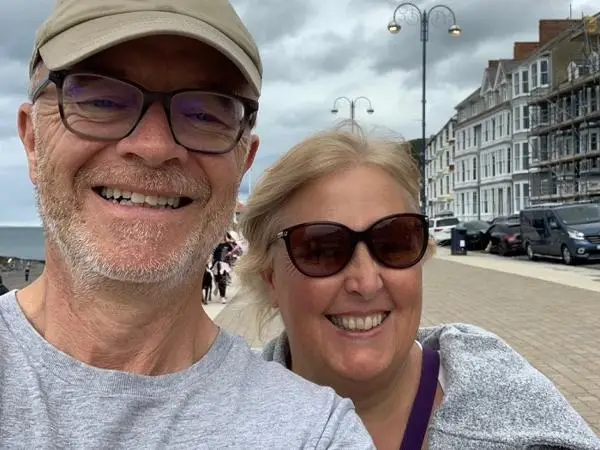New blood test could boost early diagnosis of pancreatic cancer
Researchers are trialling a new blood test that could save lives by improving the early detection of pancreatic cancer.
The SAFE-D study will see how well a blood test can detect pancreatic cancer at an earlier stage, when it is curable.
The trial is sponsored by University Hospital Southampton (UHS) and led by consultant surgeon Zaed Hamady.
It is being run by the Cancer Research UK Southampton Clinical Trials Unit (CTU).
Sean and Allison’s story
Sean Cleghorn’s wife, Allison, discovered she had pancreatic cancer during Christmas 2020. Her cancer was so advanced that she was unable to receive chemotherapy. She died in January 2021, aged 54.
Sean, from Kingsclere in Hampshire, said:
“The only symptom Allison displayed was some slight indigestion, and then she was diagnosed with type 2 diabetes in the autumn of 2020. Allison had always eaten healthily, was active and avoided processed food, so this diagnosis was puzzling for us.
“When we learned that new onset type 2 diabetes was a potential risk factor for pancreatic cancer, we asked for further testing. A scan on December 23rd that year confirmed she had terminal cancer.
“We hoped she could have chemotherapy to prolong her life, but she became too weak and died four weeks later.”
Sean has helped to raise £80,000 for Cancer Research UK with the Kingsclere Cancer Research Fundraiser group.
He said: “Perhaps if she had been diagnosed sooner with a test like the one that’s currently being trialled, we may have had time to make more memories with our three children.”

Improving survival
Pancreatic cancer is the 10th most common cancer in the UK, but the 5th most common cause of cancer death. Around 10,500 people in the UK are diagnosed with the disease each year.
The symptoms of pancreatic cancer can be vague, and often put down to other things such as a diabetes diagnosis. This means that most patients are diagnosed at a late stage, when the cancer has grown too large to be removed surgically.
Survival is therefore lower than for many other types of cancer. Only around one in 10 (8.3%) people diagnosed with pancreatic cancer in England survive their disease for five years or more.
“Allison and Sean’s story is, unfortunately, not that unusual. Improving the early diagnosis of pancreatic cancer is therefore vital,” said Mr Hamady.
“However, there is currently no targeted early detection or surveillance test for the disease. This means patients are often diagnosed late, when they become really unwell.
“If we can develop approaches to detect the cancer sooner, then there are more options we may consider to treat the disease, and patients will have a much better chance of long-term survival.”
New blood test
The Avantect test is being developed by biotechnology company ClearNote Health. It will use blood samples from people with a recent diagnosis of type 2 diabetes. This is a known risk factor and a potential sign or symptom of pancreatic cancer.
Type 2 diabetes is a disease of the pancreatic cells that make the hormone insulin. People over 50 with newly diagnosed type 2 diabetes have a one in 100 risk of also being diagnosed with pancreatic cancer within three years of diabetes diagnosis.
The SAFE-D study is therefore focusing on this patient group to trial the new DNA-based early detection blood test. It will see how well the test is able to detect the cancer in its early stages.
“Although most people with diabetes will not go on to develop the disease, new onset diabetes is associated with a 6-8-fold increased risk,” said Mr Hamady.
“This patient group gives us a way to test how accurate the new diagnostic blood test is. That could potentially help thousands of people in the future.”
Dr Mikayala King, Research and Development Governance, Quality Assurance and Sponsorship Manager at UHS, said:
"We are excited to be sponsoring this cutting-edge study, with potential benefit to patients with this devastating disease. We are happy to be working with ClearNote and to be building on our long-established relationship with the CTU to manage and deliver the project.”
Taking part
The trial is now open at several community locations across the UK. It is being carried out at community-based research hubs, making participation as easy as possible.
Dr Victoria Goss, Head of Early Diagnosis and Translational Research at the Southampton CTU, said:
“We know that some people struggle to access healthcare services and research trials due to where they live or their circumstances.
“Being able to take this study into the community, through local research hubs and community hospitals, is essential to ensuring we are making our trials equitable. This will hopefully help to reduce health inequalities, by making early cancer diagnosis more accessible to all.”
The SAFE-D study is primarily funded by ClearNote Health, with additional financial support from Cancer Research UK. It is supported by Wessex Health Partners, a regional partnership bringing together Integrated Care Boards, top universities and leading NHS organisations.
Angelica Cazaly is Senior Trial Manager for SAFE-D at the Southampton CTU, said:
“We are asking people with newly diagnosed type 2 diabetes, who are attending GP surgeries or diabetic clinics, whether they would like to take part in the study.
“Initially, we will collect blood samples from 800 people for testing. The results from the test, together with medical information collected from each patient, will help provide researchers with important information on how best to proceed with the rest of the study that will evaluate how accurate the test is at predicting pancreatic cancer.”
If the pilot phase is successful, the team will then move on to a much larger phase of the study. This will involve many more patients.